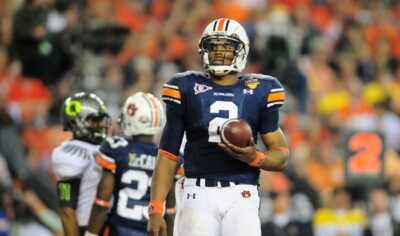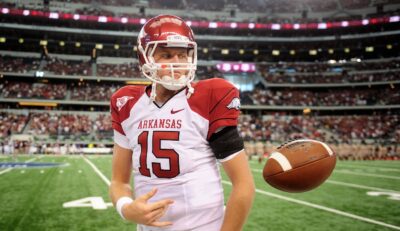Leonard Fournette has 2 insurance policies for $10 million each
By Andrew Olson
Published:
LSU RB Leonard Fournette is entering what is likely his final season with the Tigers. He’s considered a preseason Heisman Trophy candidate, and a likely early pick in the first round of the 2017 NFL Draft.
As he goes through one more season of college football, injuries are an unfortunate possibility. For that, Fournette has two insurance policies, each for $10 million, protecting him in case his career were to end or his draft status, which was recently placed at No. 3 overall by one ESPN analyst, plummets due to injury.
CBS Sports college football writer Dennis Dodd spoke to Fournette as part of an in-depth look at the “unregulated world of player protection.”
Fournette told Dodd that the policies are the last thing on his mind:
“I don’t think about it,” Fournette said. “This is the second time I’m actually talking about it. I leave everything in God’s hands.”
After talking to Fournette, Dodd’s feature shifts to its primary focus, the player protection industry itself. There are high premiums that come with the policies, and a sizable commission to be made:
These days, you cannot typically purchase one without the other even if you wanted to. And when premiums run approximately $8,000 per $1 million of coverage, there’s a lot of money going around even if the covered player finishes his career with no more than a hangnail.
Baton Rouge attorney Bryan Fisher is an expert on the issue, and had a harsh assessment of what is going on:
“The industry suffers from no regulation whatsoever,” Fisher said. “The consumer is being exploited.”
The good news for Fournette is that Fisher sees LSU as a school on the right side of the issue when it comes to advising and assisting its players:
Fisher sees himself as a reformer. … Representing players with legal challenges against insurance companies that don’t pay up is side work.
Fisher does it more out of moral conscience than profit. LSU, he says, is one of the good ones. The school genuinely cares and offers guidance when players and families go looking for insurance.
When Fournette wanted his policy to kick in at the start of this year’s spring practice, an adjustment was made and off he went. But Fisher keeps close a file of budding cases from Auburn, Michigan, Notre Dame, Ohio State and USC. All of them, Fischer contends, have misled players on insurance policies.
“Multiple players at each school,” Fisher said. “Every one of them has an injury that eliminated their draft prospects or lessened their draft prospects.”
For Dodd’s full feature, which includes more on schools’ roles in player protection and thoughts from Nick Saban, click here.
Andrew writes about sports to fund his love of live music and collection of concert posters. He strongly endorses the Hall of Fame campaigns of Fred Taylor and Andruw Jones.







